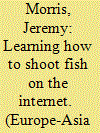| Srl | Item |
| 1 |
ID:
153075


|
|
|
|
|
| Summary/Abstract |
This article explores whether qualitative research methodologies can help improve strategic analytical processes and products. Currently, in many intelligence agencies, cultural and organizational barriers restrain the development of better strategic intelligence. An emphasis on current intelligence is rewarded over longer-term strategic assessments. However, the demands of an increasingly number of complex emerging threats can only be partially met by current intelligence. Decision-makers also need a revitalized strategic analytical capability to help with policy planning. This article investigates whether further consideration should be given to improving strategic analytical skill sets by a greater adoption of qualitative social research methodologies by the intelligence enterprise.
|
|
|
|
|
|
|
|
|
|
|
|
|
|
|
|
| 2 |
ID:
114955


|
|
|
|
|
| Publication |
2012.
|
| Summary/Abstract |
This essay examines regimes of internet use, and the significance of the internet for everyday lives, in the Russian margins. The field site, a small provincial town in European Russia, was visited in 2009 and 2010. Informants were mainly families dependent on a single non-professional wage. Research materials-semi-structured interviews and participant observation-comprising an ethnography of internet use, are supplemented by survey data. Qualitative social research on new media use has critically examined technologically determinist assumptions about social effects of the internet, including the so-called 'digital divide'. The present research also seeks a contextualised understanding of new media use by considering how it is embedded in established everyday social settings and practices. The ethnographic materials and survey data collected indicate that Woolgar's rules of virtuality hold true in the Russian margins: use of new media depends on the local social context and supplements, rather than replaces real activities. Most users in the group surveyed are highly instrumentalist and have little interest in the communicative and non-grounded aspects of the media. At the same time the impetus for initial access to the internet is closely related to issues of esteem and peer recognition within a social network rather than actual need.
|
|
|
|
|
|
|
|
|
|
|
|
|
|
|
|